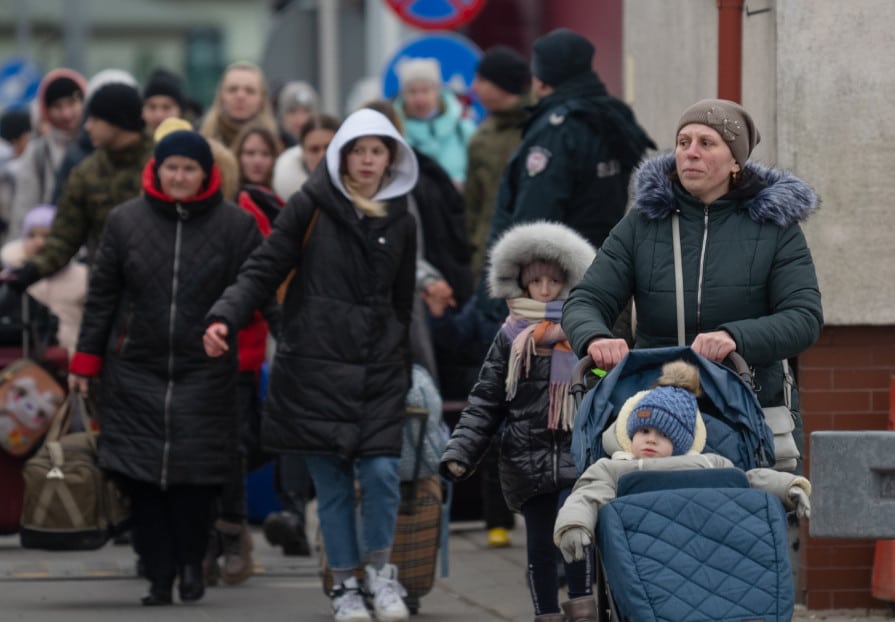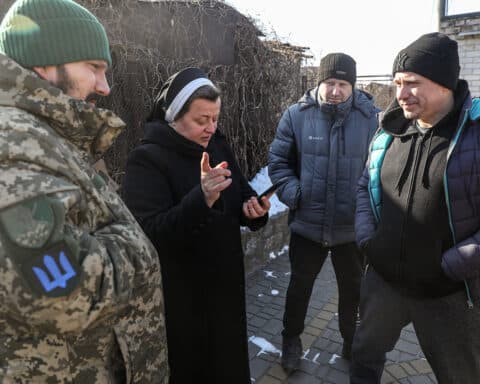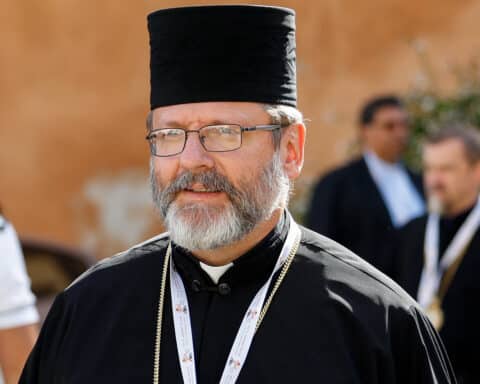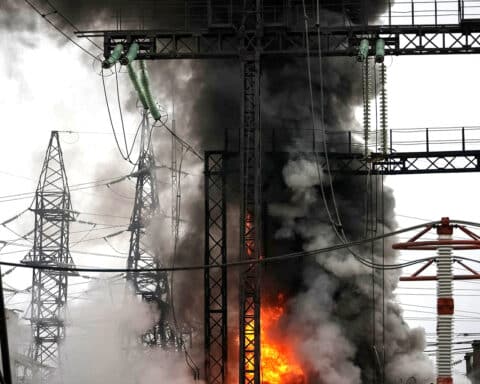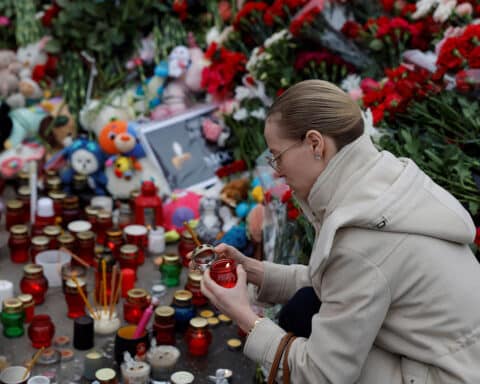As I stood on the Polish side of the Poland-Ukraine border at Hrebenne, I gazed at a flood of cars. One line of trucks extended several hundred yards. This line was of trucks and buses and cars going into Ukraine from Poland. The other line of cars was mostly refugees coming from Ukraine.
One woman drove from Ukraine to Poland. When she crossed the border, she promptly stopped her car and began to weep.
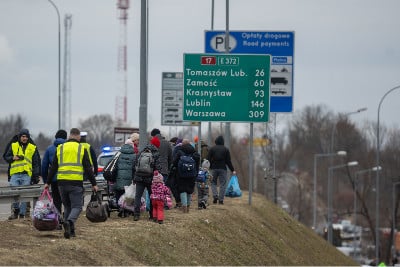
The border crossings into Poland are flooded with people. The quiet village of Hrebenne, with a population of 209 people, is hosting thousands of Ukrainian refugees daily. Hrebenne lies about 45 miles northwest of Lviv, Ukraine. Without traffic, it’s a one hour drive.
At Hrebenne, the Knights of Columbus have taken a substantial role in refugee relief. Under the leadership of Marcin Wojciechowski, Council 15267 from Tomaszów Lubelski has established an immediate aid center. Wojciechowski described the project saying, “We are just trying to provide some warmth for mothers and their children who are crossing the border.”
The Knights have taken to calling their aid tents Mercy Huts. It calls to mind the words of Pope Francis: “The thing the Church needs most today is the ability to heal wounds and to warm the hearts of the faithful; it needs nearness, proximity.” The pope continued: “I see the Church as a field hospital after battle. It is useless to ask a seriously injured person if he has high cholesterol and about the level of his blood sugars! You have to heal his wounds. Then we can talk about everything else. Heal the wounds, heal the wounds. … And you have to start from the ground up.”
Read more from Father Briscoe in Poland here.
Here in Poland, the Knights have started from the ground up. They are offering a place to begin to get warm. The Knights of Columbus are the Church present on the front lines.
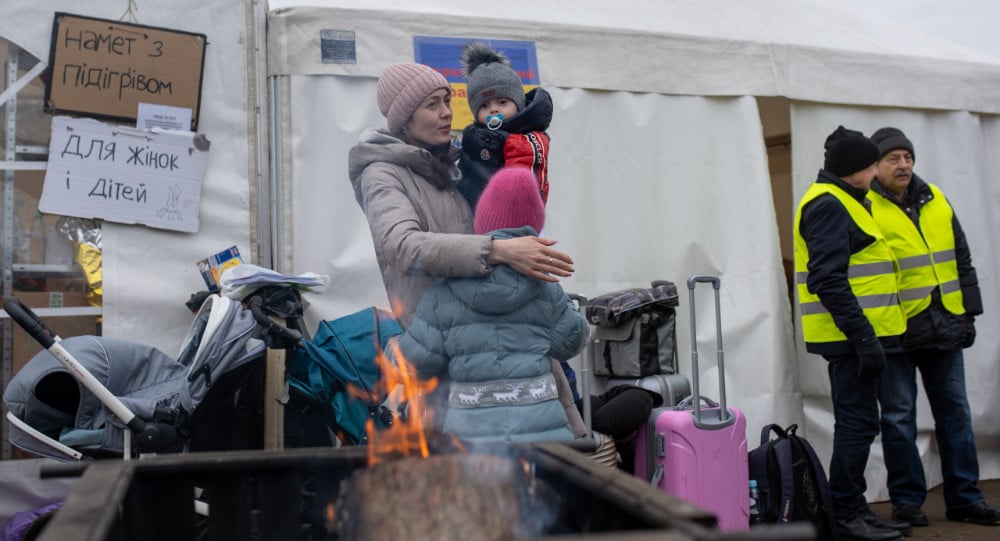
Mercy Huts
In the afternoon of March 11, it was 36 degrees Fahrenheit in Hrebenne. As the sun set, the temperature dropped into the low 20s. Many Ukrainian women and their children are walking, overnight, without much sleep in the cold to cross the border. When they arrive, they need to warm up.
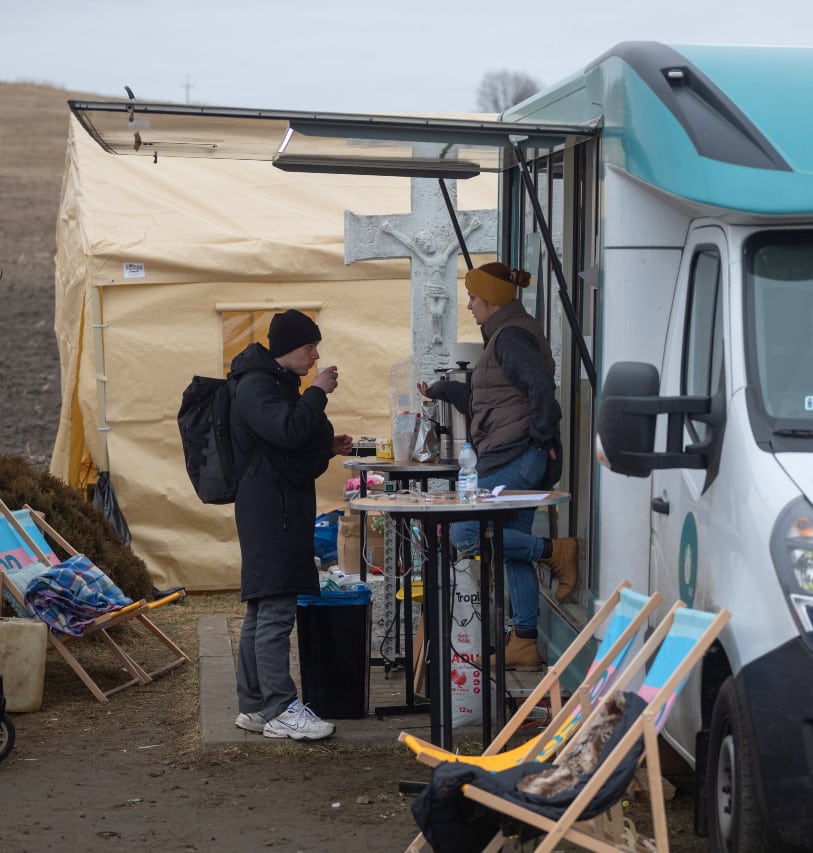
As the refugees cross the border, volunteers run to meet them. People help them with their luggage and direct them to the different amenities of the refugee camp. Present are an ATM machine, a Wi-Fi hotspot, a cellphone charging station, a stall distributing SIM cards, and hot food lines offering sausages and full meals. None of these places are heated, though. The Mercy Hut offers a space to rest, relax and warm up.
But the Knights’ Mercy Hut offers much more than a place to pause and warm up. The Mercy Hut — which is not just a hut, but rather a network of tents — offers hot drinks like tea and coffee.
Councils from all over Poland are taking up collections and sending money and nonperishable goods. Piles of supplies are free for the taking for Ukrainian refugees. There are cakes, cookies, paper towels, toilet paper, chocolates, canned goods and more.
Plastic chairs line the Mercy Hut, offering refugees places to sit. Clean blankets are available for use or for the taking.
Since most of the refugees are women and children, in the Knights of Columbus hut, there is space set aside for them. Recognizing the terrible situation many of these women have been through, the Knights and their sons staff the outside, and their wives and daughters support the inside. No one is naive about the trauma so many have suffered. It can be seen everywhere.
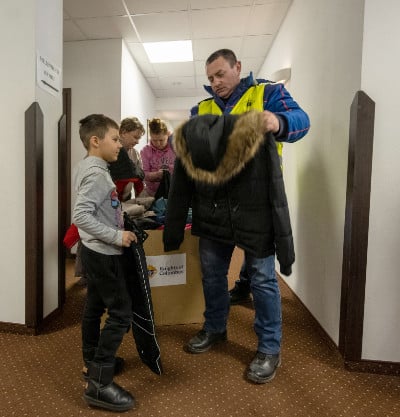
Everything a mother or child could need is provided. There is a changing table set up for babies. Strollers and car seats and baby carriers line the outside of the tent. Knights have even provided toys for the children who have had to leave everything from their homes behind.
The Mercy Hut at Hrebenne is also an actual field hospital. “The only medical point here was built by the Knights of Columbus,” Wojciechowski explained. “We have collaborated for 12 days now with the medical staff.”
The idea came from meeting the needs of the moment. After establishing the first tent, the Knights realized that the professional medical personnel, including doctors and paramedics, needed a space to treat patients.
“At first there was no place for them to go,” Wojciechowski said. “Medics were just carrying bags all over the crossing area. In crisis situations, they were administering IVs and other medical care in the Knights of the Columbus tent.”
A humble and dedicated man, Wojciechowski was reluctant even to talk about all the work he’s done. Polish state deputy Kryzysztof Zuba described Wojciechowski’s efforts saying: “Marcin is here all the time. It was his idea to arrange this hut here.”
The extreme conditions, which demand immediate relief and need at the border, galvanized the Knights. “We conceived the idea for this center in two hours,” Zuba said. “It was built very quickly.”
Because of the increased bombings on Western Ukrainian Cities, especially those with military airports, humanitarian experts expect an accelerated and increased rate of refugees.
Consequently, the Knights hope to expand the network of tents that is their Mercy Hut at Hrebenne.
“We want to get more tents, but the market is flooded with requests,” Wojciechowski said. “One of the tents … was rented from over 100 miles away.”
Throughout the day, his fellow Knights praised Wojciechowski’s dedication. One told me that Wojciechowski was working 15-hour days at the site. When asked about his motivations, he said simply, “I just want to help people.”
Volunteers from around the world
In addition to the collaboration with medical professionals onsite, Knights are collaborating with other volunteers. One woman, a Russian speaker from Great Britain, came because she heard there was a need.
Chloe Arnold decided to join a Polish friend of hers who had been volunteering for 10 days.
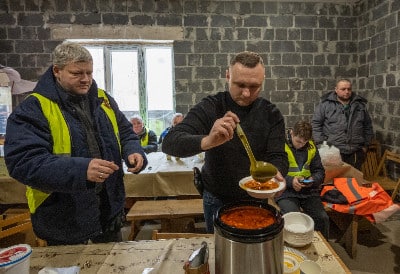
“There are so many Polish volunteers,” Arnold said, “but there’s a language barrier. I’ve only been here since midday today, but I’ve seen so much and talked to so many people.” Arnold has lived in Russia and has been teaching Ukrainian journalists in Paris. “Just seeing the need, hearing what’s been on the radio, I had to come.”
One woman whom Arnold helped had an urgent need. Two Ukrainian women, about 20 years old, were traveling together with three little dogs. To Arnold, they seemed upbeat and happy to be in Poland. Arnold said that one had gray eyes; she just looked like something was wrong. Because Arnold was able to speak with her, the young woman explained that she had recently had a kidney transplant and she needed a special medication so that her body wouldn’t reject the new organ — she only had a few days left. Arnold was able to arrange for her to be transported to a hospital in Lublin and receive the medical care she needed.
Even at a smaller crossing like Hrebenne, the tents can be difficult to navigate. Arnold explained that many of the Ukrainian refugees who arrive are in shock. “They’ve been traveling for three, four or five days. They’ve left Kharkiv or Kyiv, possibly under gunfire, so once they cross the border they are quite traumatized,” she said.
One family of six arrived at Hrebenne on March 11 from Kyiv: a grandmother, her husband, her son and daughter-in-law, and the two grandsons. Arnold told me, “When Kyiv came under fire, they fled to their cabin outside the city, but that took them to the front line.” They found themselves in a no-man’s-land between the Ukrainian Defense Force and the Russians.
For 12 days, the family had no electricity and very limited food. They had used up all of their candles. “Their stores were running out,” Arnold said. “They knew they had to leave, but they didn’t know how.” With planes and gunfire around them, they had no idea which direction would be safe. Eventually though, the grandparents and parents were foregoing meals to feed their grandchildren; they were barely eating themselves.
They decided to take some sheets and make them into flags to wave over their heads as they fled on foot through the forest. “Miraculously,” Arnold said, “they escaped the gunfire.” Then they spent five days walking to reach the border. When the grandmother reached Hrebenne, she said: “I have not taken off this fur coat for 12 days. I just want to take off this coat.”
“There was a young girl here today, about 11 or 12. She was silent. She was just sitting there. She’d been given a bar of chocolate, she’d been given a toy, but you can tell, you know, they’ve been traumatized,” Arnold explained. The mothers, too, are suffering. “They’ve left sons behind, they’ve left fathers behind. We have to help them on the very, very first stage of what is going to be a long journey.”
From the welcome camp right at the border crossing at Hrebenne, refugees are taken to a refugee camp five miles away or directed to buses to take them to Warsaw. Many Ukrainians have family or friends or friends in Poland. They want to use these connections to stay until they feel it’s safe to go home. Most are reluctant to leave Poland. They want to stay, in hopes of returning home to Ukraine.
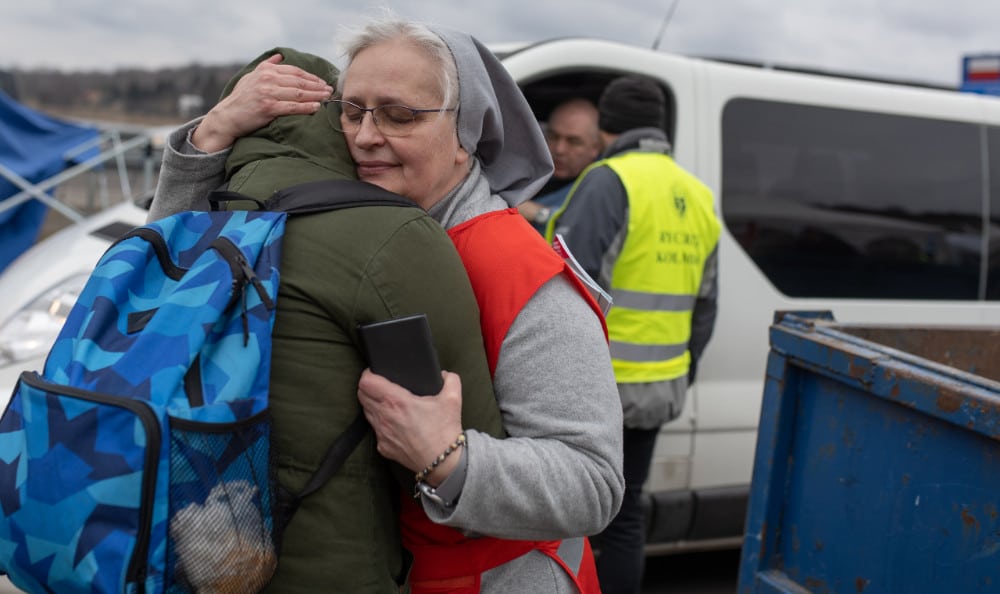
The spirit of Poland
In Warsaw, one of the main centers for providing assistance to refugees is Warszawa Centralna, the main train station in downtown Warsaw. There, volunteers have flooded the scene. Despite the tragedy of war, the spirit of solidarity and charity among the Polish people is on full display.
When Ukrainians first started arriving, Warsaw’s residents started bringing them food and caring for them. Eventually, things became more organized. Currently, the firefighters are taking the lead in offering relief at the station, though they are joined by hundreds of volunteers, including Catholic religious and young people, such as scouts. As the number of Ukrainian refugees continues to increase, the need will only grow.
When I asked Leszek Waksmundzki, a Knight of Columbus, why he was so motivated to serve, he soberly explained: “I know from my grandfather and my parents about the war. They remember. They were also refugees. They spent two weeks in Lithuania trying to escape the war.”
For Poland, these stories are present; they can’t be missed. Waksmundzki said: “America was part of the war, but the war was not in America, in American places, on American ground. We remember what it was like. We remember the war. It was here.”
The first night I spent in Warsaw, I stayed with the Redemptorists. I would have stayed with my Dominican brothers, but the Dominican Provincial headquarters in Freta was already full of refugees. The Redemptorists, who themselves have welcomed three Ukrainian families, are located right next to a memorial dedicated to the Rzeź Woli (the Wola massacre).
To stop the momentum of the Warsaw uprising during the Nazi occupation of Poland, Adolph Hitler ordered the murder of some 50,000 Poles in Warsaw. The systematic murder of the residents of Wasaw’s Wola neighborhood took place from Aug. 5-12, 1944. Among the dead were 30 Redemptorists. The memories are seen everywhere. They cannot be avoided.
Young mothers, women and children
Like Hrebenne, Budomierz is just a small village of a hundred or so inhabitants on the Polish-Ukrainian border. Situated just 70 kilometers west of Lviv, it, too, has become a major crossing for Ukrainian refugees.
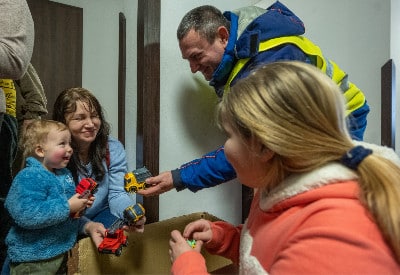
At the refugee welcome camp on the Polish side, I met Anna Vlovichenko and Victoria Bazhenova. Traveling with Anna’s family, they count themselves among the lucky Ukrainian refugees who have arrived in Poland.
Hopeful and positive, the two women, both in their 20s, are close friends. They were able to take a train from their home, Kharkiv, to Lviv. Then others in Lviv helped Anna, Victoria and their families to find a ride to the border crossing at Budomierz. Since they were traveling with small children, people arranged a ride for them.
When asked what she wanted people to know about the situation in Ukraine, Anna sighed deeply and said: “Pray for Ukraine, because it’s so scary. This is awful. It’s impossible for me to watch what’s happening to our city. So we decided to go where there’s a chance to live.”
Anna and Victoria hope that their homes will not be destroyed. They don’t want to move away; they want to return to Kharkiv. Anna said that some of her neighbors’ garages have been levelled by Russian bombs. Hers, too, has been damaged.
When asked where they will go, Victoria said simply: “Since Feb. 24, our lives have completely changed. We have no plans. We just want to stay safe and to stay alive.” They are among the many Ukrainian refugees that hope to stay in Poland or Germany and work until they can return home. Victoria said that she considered staying but was terrified by all the sounds and sights of the war.
For her part, Anna’s mother, Helen, said that she wants to go home, to go to her church, which has been destroyed, and to rebuild it. “I worry that my children can’t continue their education. I hope they can continue to go to school.” Helen carries herself with a more somber attitude than her daughter and Anna’s friend, Victoria. “I am hurt and heartbroken,” she said.
Victoria chimed in: “Every mother in our country is worried about her children.”
Despite their uncertain future, Anna and Victoria express hope and thanks. “We are so thankful for all the people that have helped us,” Anna said, “those who have given us transport and shelter and food and hot tea. Thank you.”
Victoria shares that their escape was her brother Sasha’s first time in Lviv. He said: “What a wonderful city, what generous people. They’re so kind!”
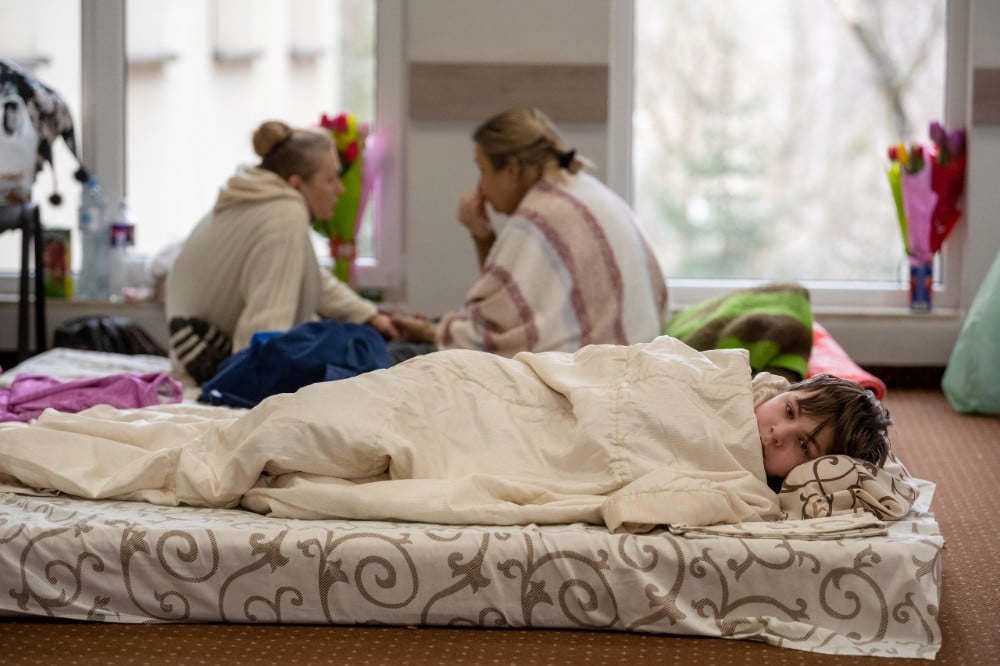
Krościenko
Like at Hrebenne and Budomierz, refugees are crossing on foot at Krościenko. Nestled in the mountains, this sleepy checkpoint was previously used by a few cars or trucks daily. One policeman told me it was almost dead. Now 80,000 Ukrainian refugees have crossed here since Feb. 24 — more than 40,000 on foot.
Maggy Trojca came from Germany to volunteer. She’s a police detective by profession. Her boyfriend has been working on a European peace-keeping mission in Ukraine, so she feels very close to the war. Trojca explained her decision to volunteer, saying, “You can donate money, you can donate stuff, but there are hands needed to hand out warm beverages, warm blankets when they arrive here at night when it’s cold.”
Trojca offered to help at a Caritas tent giving away food. Caritas is Poland’s largest charity. Providing national and international humanitarian aid, Caritas Poland is the equivalent of our American Catholic Charities.
After volunteering a few days, Trojca needed a break, so she was going to go to Krakow, about 185 miles from Krościenko, to visit a friend and rest. So she offered a ride to anyone that wanted to go West. A woman, her son and a teenage girl took Trojca up on the offer.
Since they were together, Trojca presumed they were a family. But as they chatted, it became clear that they were not. The teenage girl was traveling alone, and because she was alone, she had just joined up with this mother and her son. In 2014, the girl and her family had fled Crimea when the Russians came. They thought they would be safe in Kyiv. She told Trojca, “It’s the second time I’m fleeing my home under gunfire.”
Trojca was going to drop the young girl off at the train station in Krakow. Trojca explained to her that the trains are running free of charge. Then the girl took Trojca’s phone and typed into the translator asking if Trojca would go with her to make sure she gets on the right train because when Trojca left her, she would be all alone and she was afraid of getting lost.
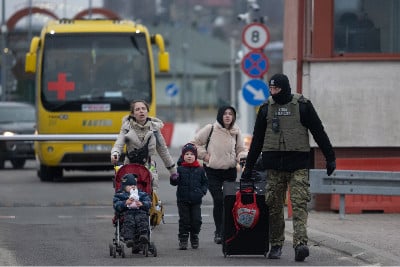
So Trojca dropped the mom and her son in Krakow and drove the young girl to Warsaw. When Trojca told her that the drive was three more hours, she again grabbed Trojca’s phone and asked, “How much will I owe you for that?” Choking back tears, Trojca said, “I told her nothing.”
When Trojca first picked the girl up, she says the teen had the most expressionless face she had ever seen. “It was more a mask than a human face.” But when Trojca dropped her off at an apartment building in Warsaw, she got to witness the joy of this girl being reunited with her friends. Again in tears, Trojca said, “As she looked toward her friend, she looked so happy, she looked like a normal teenager, then.”
“It’s killing me,” Trojca said, recognizing that this is just one of the 2.5 million stories of those who have fled. Trojca concluded: “I’m here because there’s something good I can do. It’s a drop in the ocean, maybe, but it’s something.”
The Russian invasion of Ukraine has brought so much darkness, but there is some light. The charity and compassion of so many Poles, not just aid workers, but regular citizens stepping to help, is on display everywhere. This charity is a promise that the future will be something new. Many Poles have personal and family connections to Ukrainians.
But history is history, and in Poland you cannot avoid seeing historic wounds of decades past. By welcoming so many Ukrainian refugees and making significant sacrifices to transport and house them, the Polish people are raising a flood of light in the darkness. And the darkness shall not overcome it.
Father Patrick Mary Briscoe is the editor-in-chief of Aleteia.org.
| HOW TO HELP |
|---|
|
The international Caritas confederation is collecting funds to help Caritas Ukraine. In the United States, that is through Catholic Relief Services. Internationally, you can donate through www.caritas.org/. In the United States, the Ukrainian Catholic Archeparchy of Philadelphia is taking donations here. Two pontifical agencies also are taking donations for Ukraine: Catholic Near East Welfare Association, and Aid to the Church in Need. Internationally, Aid to the Church can be reached here. The Knights of Columbus launched the Ukraine Solidarity Fund, and donations can be made here: https://www.kofc.org/secure/en/donate/ukraine.html. On Feb. 25, the Knights of Columbus announced a commitment of $1 million for immediate distribution to support Ukrainian refugees and will match all funds raised up to an additional $500,000. The relief funding will be used to provide shelter, food, medical supplies, clothing and religious goods, as well as other humanitarian needs as identified, both directly in Ukraine and through refugee sites in Poland. Donations can also be made to Jesuit Refugee Service at www.jrsusa.org to support the agency’s work in Europe “to accompany, serve, and advocate for those forced to flee from war and conflict.” The Salesians also are accepting donations to help refugees here: salesianmissions.org/lp/ukraine-emergency/. |

